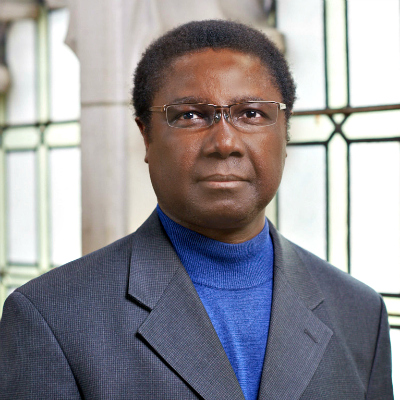Dr. Aliou C. Niang is an associate professor of the New Testament at Union Theological Seminary.

What brought you to Union?
I was teaching at Memphis Theological Seminary in Memphis, TN when Dr. Cone was invited as Keynote speaker for the Barbara Holmes Lectures. That was the first time I met and had a conversation with him. I asked him, “Where do you teach?'” and he said “I teach theology at Union Theological Seminary.” He went on to say that Union is a place where the promissory practice of diversity can and does actually happen. Put differently, it is a community that promises and practices diversity. Now, of course, we can debate what that means for individual community members. That being said, here is what I learned from my conversation with Dr. Cone. Union as a space of diversity means that it is a community where divine presence is experienced, the work of community members is valued, and practices of solidarity are affirmed.
Dr. Cone also said Union is a place where faculty members are encouraged to teach, speak, and write about cutting edge issues. It is a seminary where faculty might birth unique ways of addressing those cutting edge issues and help students speak and practice justice. Union is constantly nurturing and constructing what Justice means — a daunting and yet noble practice. Listening to Dr. Cone, I learned that justice is always under construction — a virtue to cultivate — something that is not fixed, but always changing based on how it is being negotiated. In addition to being a diverse community, Union must have an international take on issues, not just from the context of New York or America. Maybe you think locally but it is realized globally. My understanding of Dr. Cone’s point is this: Union promises as well as practices justice. When I came to Union, I discovered the promise and practice of justice Dr. Cone was talking about — organic and lively. I consider it my own responsibility to be part of that ongoing construction.
What advice do you have for students here at Union or prospective students?
My advice is to carefully learn what it means to actually cultivate justice. Because every time that I think about justice, I am thinking about it in the context of that diverse community. Justice for one group may not be justice for another. So the question then becomes how do we cultivate justice in community. This is not just advice for students but also advice for me as well.
I encourage students to engage Union’s construction of diversity and justice and practice an introspective critical stance, admit individual limitations, and exercise respect for others. Justice is an organic, delicate, and indispensable dimension of wellbeing. Staff, students, and faculty should intentionally act on Union’s mission to ensure that Union’s promise of justice for all is nurtured.
What is something that you still want to learn about?
I came to Union with some ideas from my native country Senegal, West Africa and found some of them being worked out at Union. Our first postcolonial president, Léopold Sédar Senghor, was one of the three founders of the movement called negritude. Founders of this movement were conversant with some of the leaders of the Harlem Renaissance in early 1930s such as Richard Wright and others. Negritude is not well known in the West except in some American English departments and rarely in seminaries, divinities, or schools of theology. Senghor was a person who valued cultural dialogue and justice. He believed that regardless of where people come from, they can share the best of their culture, namely cultural exchange. He believed intercultural exchange has a great potential for cultivating lasting dialogue and exercise of justice among cultures.
As I said above, I came to Union with some ideas from my Senegalese Diola culture and insights from the Senghorian legacy. Many thinkers critiqued Senghor for his willingness to welcome what he considered to be the best French culture offered. His embrace of French culture in no way precludes his critique of the evils of the transatlantic slave trade and colonization. His legacy was enshrined in the movement he co-founded with Léon-Gontran Damas and Aimé Césaire — Négritude. Négritude as reframed by Senghor aimed at decolonizing colonial Africa, especially French West Africa. This is why his thoughts are crucial to my scholarship in many ways. The injustices of the slave trade and colonization happened and urgency of the moment rests on creating possibilities for a way forward. Senghor called for the practice of forgiveness tempered with persistent critique of nagging colonial and neocolonial abuses to ensure they never happen again. The question is: how does one move beyond the shambles and trappings of colonization?
Senghor’s answer is rootedness in one’s own culture and openness toward other cultures sustained by “dialogue of cultures” in which each culture would be free to share something unique and invaluable with other cultures are the ways for a sustainable future for humanity. To Senghor, an intentional exchange of ideas and practices that would engender another culture he characterized as civicilisation de l’universel, “civilization of the universal” are essential. What does this mean for Union? I see what Senghor is saying already embodied in Union’s mission — Union as a community of staff, students, and faculty is already practicing an indispensable dimension of Senghorian idea. We should continue to construct our practice of diversity which I hope would provide a concrete model of what it means to be a community for others to emulate. This is what I am learning to do here at Union.
